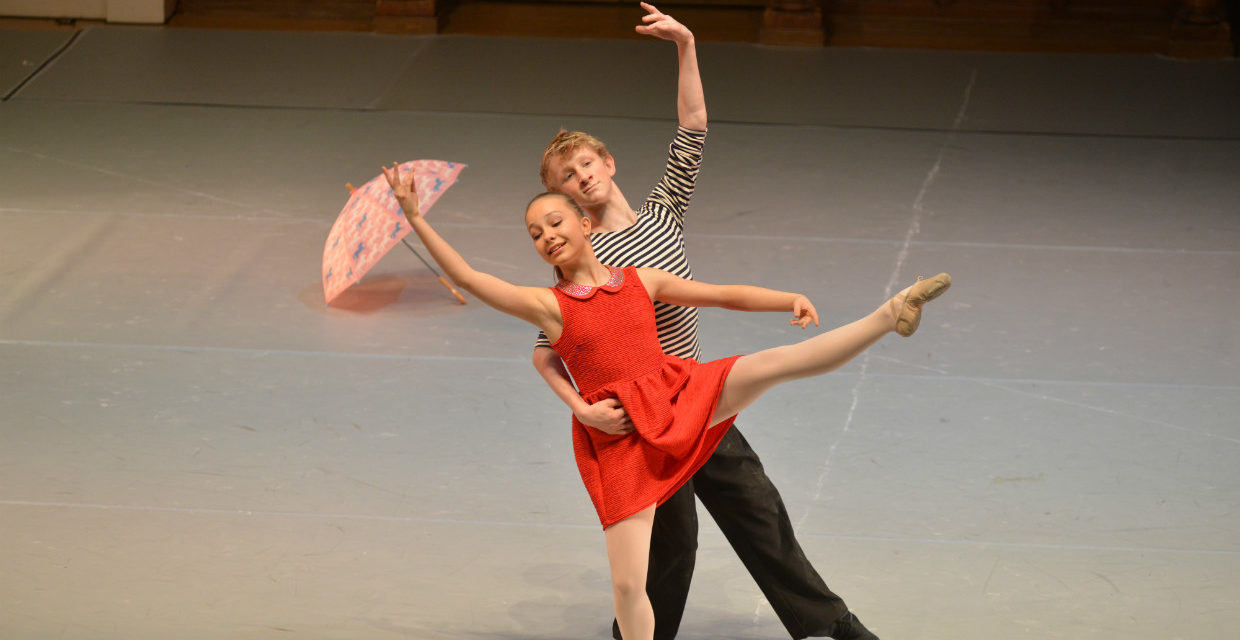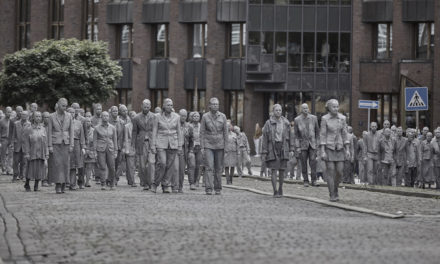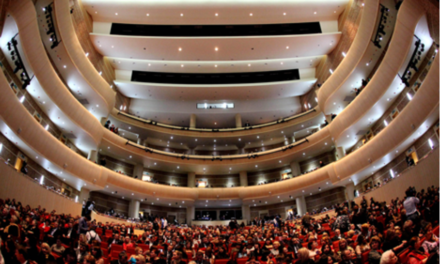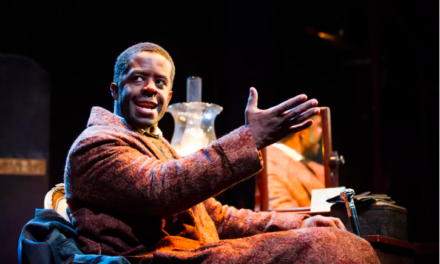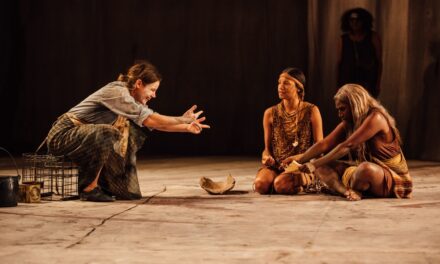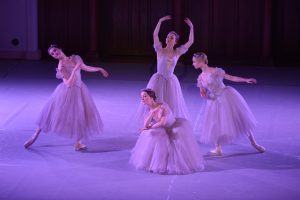
The London Russian Ballet School is unique in its offer of an authentically Russian ballet education in the heart of the UK capital.
The London Russian Ballet School is unique in its offer of an authentically Russian ballet education in the heart of the UK capital. The school provides vocational and recreational training as well as conducting outreach work via its associated charity, Kids Love Lambeth. Leah Lord sat down with Director Evgeny Goremykin to find out more about the school, the charity and Goremykin’s own career at the Bolshoi Ballet.
Leah Lord: Evgeny, what was it that prompted you to set up the London Russian Ballet School?
Evgeny Goremykin: I was in ballet school myself for 8 years in Russia – my happiest years in my life – and after this, I was accepted into the Bolshoi company for 20 years. In the first or second years after ballet school, we were still in contact with our teachers and they talked to us about what we would choose to do when we stopped dancing. Even now, ballet school and 20 years on stage seem like it happened just yesterday, but they tried to prepare us. Everyone said we want to be great teachers like you, but they told me that because you are bright and clever, you have to go and be a big choreographer. I said, well, I’m not like Grigorovich or Petipa! Nowadays, it is different, everyone does it. So I decided to go into the field of ballet criticism or be a ballet historian and went to Moscow University for 5 years. It was a general education, but my diploma was in ballet journalism or ballet television production, something like this. After this, I changed many times my occupation, but I would like to tell you that even my teachers told me that I’m happiest when I’m teaching ballet. I feel like a fish in water, I’m really happy. But even for this, there was not a straight way. It was hard, but I like my life and what I’m doing. So in that case, when I came here I started with a small studio then started the school after.
LL: What is your vision for the school today?

In Russia, it was really very tough because you could be a brilliant dancer, but if you have very bad marks in school they will kick you out.
EG: My vision is not very different to the traditional education in Russia. If you choose to be a ballet dancer, it’s not like choosing two topics like English or Literature, you have to do everything like in a normal school. So in ballet school, what we do in 8 years is that we have 3 educations. We have the dance, starting with the classical ballet, of course, then, the character, gymnastics, contemporary, pas de deux lessons, all this. Plus, we are doing the course of the music college, plus the state exams – maths, Russian, literature, history, physics, everything. So when you have the diploma, you are actually ready to go to another college or university, for example. I think that’s good because this life is very fragile. Of course, we educate to be tough, strong, sportive, with lots of stamina, but sometimes there can be injuries or health problems and you have to start another life. If you’ve only done two topics, how will you do that? It’s better to have a proper education, so here we try to make something similar to Russia and offer the same – ballet education with connected disciplines and as a plus to that we offer academic lessons, or our younger students will go to school and come here after for ballet lessons. In Russia, it was really very tough because you could be a brilliant dancer, but if you have very bad marks in school they will kick you out. Even if you hate physics or algebra, you still have to do it. Now, I am very proud of my life; I have not felt hopeless ever because maybe I don’t know all details but I know something of everything, which gives me the stamina to do anything. We can’t build Renaissance people like Michelangelo, he was a genius, but we try to create normal, clever students who feel they can take on any condition in life. So that’s my vision for the school.
LL: The school offers full-time vocational training as well as regular children’s classes. What kind of experience can the London Russian Ballet School offer to a pre-professional ballet student and what training and opportunities can they expect?

EG: To be honest, it is not certain until the end. We try to build. My thought is that I like to teach students and children to one day be ready to leave and go into a company. To be ready to do any type of dance, to be in good shape, to have good coordination and technique. Number one, they will be very beautiful dancers, but they will only have that beautiful shape of Russian schooling with proper technique. Depending on their choice of vocation, the company they chose or the company who chooses them, I just teach them to stay on their feet! It is not so much the steps as how you put them together. For example, it is very important to train correctly to avoid injury. I know how to do this myself and during my career, I had no major injuries connected to bad training. I don’t like to say we are the best but if you talk about how many people finish school and come to the stage, it is the Russian school that succeeds. If you look around the world, who are the principles of the companies? They are Russians. It’s a great system. Already, our students have had invitations from companies such as the Bolshoi and American Ballet Theatre. We are young, so from now on they will start to take part in the international competitions, but it is very important for us that we do not go for medals, we go for practice. More performances, more practice. We have been this summer in Varna and we did not win anything, but in my opinion, they were great. Four festivals have already invited the school to go and dance because they thought we were so beautiful. It’s a little bit like X Factor, which people will pass to the second round in ballet competitions because it’s all the opinion or politics of the jury. Still, I love Bulgaria and Bulgarians. I have been on the competition circuit in Varna 30 years ago and it’s not that different now; I’ll look and see exactly the same mark on the stage! So for practice, we have invitations from Bolshoi and Mariinsky. If they need extra dancers, they will use our school. They have already been to the classes and seen they can match the level of the production.
LL: What successes have former students gone on to achieve?
EG: Some students have moved on to other schools, good schools, some of them in Russia. Sometimes at the start, there were not as many facilities here, so they went onwards. We would usually send boys to Moscow and girls to St. Petersburg. Now, we start to have dancers like Nathalie Carter. She is on standby in the Bolshoi. She is very good in classical and very interesting in contemporary. She has been to ABT as well. She has some small issues, some elements of her technique to work on, then she is ready to go. Then, I have to push the next generation. Some of the other girls are ready but they are young and have not finished their academics. Not many, about 5, but this is very good for a small and new school. Two, Mariana and Kamila, could already be in a company. We also have a talented boy, Fred. It is good when people come here from a young age, like Fred. He is so beautiful, he has a wonderful shape, feet, legs – everyone would die to have that! He is very good, not perfect, but I am really proud of everything he is doing – that is mine. If he missed something, that is my fault, I know that, but he is still learning. If others arrive and they already have terrible habits, it is much harder to change. So we start now with the young classes, with a proper teacher, and build the proper picture.
LL: In recent years, ballet has become a popular pursuit for adults, including absolute beginners as well as those who danced in their youth. What opportunities do you offer for adults and what encouragement or advice might you give to a newcomer considering trying out a class at the school?
EG: Good question! We have adult classes. A lot of people move here because we try to do them closer to a professional level, not just to come and do this for shape or physical activity or whatever; proper combinations and connection with the music. We have a different range of students, some of them beginner. For some of them it is fine, but for some, I think it’s not if for all your life you are doing something else but instead, you want to be a dancer or find some way to express yourself. We have another group who were in ballet when they were young and that is the best group, a dozen ladies who are very, very delicate and beautiful dancers. They even started to do pointe work with one of the teachers. Of those dozen ladies, I’m really, really proud. It’s a pity that they did not have a chance to dance and I’m very lucky to have them. We actually have one lucky person here, Astor, he came here quite a bit overage – not too much – but he is a teenager. I asked him, why have you come here? And he told me: because I want to be Baryshnikov! He said this in an honest, almost childish way. And I said it’s a risk, but after 3 months [in the school’s vocational training programme], he has danced 5 or 6 times in my performances now. Usually, I’m very critical, but when he said “I want to be Baryshnikov,” I took him just for that! He did not say “I’d like to be like Baryshnikov,” he said, “I want to be Baryshnikov!” And for the first time in my life I say, OK, just for that I will take you. I can give advice: come here to understand what we talk about. It’s not over simple or over complicated. Don’t be afraid if it looks a little bit like routine, because if you go to the gym, you do the same, the same sets. It’s everywhere; if you just come once, then you can’t be Margot Fonteyn or Anthony Dowell. So just try. It might not mean you stay here forever. Never be shy or too modest. It’s not necessary to do it here – dance anywhere, just give it a go. If for example, you come and we decide you are good enough you can be part of our performances eventually, but it will take time for beginners, sometimes one or three years. What you are doing is not only to dance in the studio but to dance on a stage. It’s difficult for special performances with timetables and work but as a professional, I can tell you it’s a first love to perform, maybe a second when you have a child, but nothing can replace that happiness you have when on the stage. If you feel you have to dance, you have to do something.
LL: Before the London Russian Ballet School, you previously danced at the Bolshoi Ballet in Moscow, including principal roles. What were the highlights of your dancing career?
EG: I think my best one would be dancing performances with the choreography of Yury Grigorovich, the Artistic Director who made Spartacus, Stone Flower, Legend Of Love and so on. He was a great master. It was very interesting to do all the new performances as well, but the classical performances are very rich. Everyone can make their own roles, so that was very good. The Russian method is not to copy, for example, to dance like Galina Ulanova, instead, everyone must make the same steps but do it in a different way. When I was a small boy, I was an extra, one of the boy servants in a tavern scene and I saw Plisetskaya. Can you imagine? It happened in the Royal Ballet and I walked to Croydon after the performance because I could not imagine what I saw. With that emotion, what would I do in the tube, the Underground – I’m sure I did not just walk, I danced! That was a shock. Most of all I was just happy to be a member of the company. In that time, even second soloists could be principals around the world, it was at that level. Happy days.
LL: What was your favorite role to dance in your career, or perhaps a specific performance?
EG: I have 2. No, I have 3! One of them I love and hate at the same time because I danced this 274 times. It’s Coppélia and I danced this from when I was 15. So, in that case, I hate that but it is a beautiful performance. Because of the people who showed me how to dance this – and I did not dance this straight away – Giselle. The more experienced and elder generation of dancers and teachers showed me and when I was ready to do that I did. If you consider that the ballet is 170 years old, then that does matter. My favorite performance is Legend Of Love. Grigorovich. I loved this performance so much I said I could be a chandelier or fan, or just stand like a tree just to be in it, because it is just so beautiful!
LL: How do you think your experience at the Bolshoi might have informed your teaching style?
EG: Fully. I try to be suitable for that great system. I have a huge desire to do that because sometimes I have thought about that and realized that if I will not share or give somebody that knowledge about my teachers and what my experience was at the Bolshoi, then that knowledge will kill me. Really, because it’s so beautiful; it’s a huge treasure. I have to try and pass this on to the students for the next generation. It’s a very strong feeling. Maybe this generation will not be that level of my time, but maybe that generation after will be. That all-star class, 40 people who could be principals, gods, and goddesses of dance. Plisetskaya, Vasiliev, Strutchkova, Maximova, Lavrovsky. If I have any questions, I always ask my teachers and ex-dance partners. They are still working, like my teacher, Boris Akimov of the Bolshoi who was Artistic Director for 5 years and is an Honoured Artist of Russia. And of course Svetlana Adyrkhaeva, always. They have been to my school here and they always watch what I am doing and I’m very proud of that. I have my friends, ballerinas with whom I danced, like Lyubov Kunakova, Honoured Artist of Russia from the Mariinsky, who rehearse with my girls. She comes and helps. And of course if there is a chance for my students to see Bolshoi performances, we will go there, or to the big screen, or watch from the wings. They have to see what they have to do.
LL: During the Bolshoi Ballet’s residency at Covent Garden this summer, the school made links with the company. What events were you able to set up with the Bolshoi and how has the school benefited from this?
EG: Well, that was a good opportunity because, though I never broke ties with the Bolshoi, now we have a new Artistic Director and General Director there, so I renewed that position. It was 60 years since the first Bolshoi visit in London with the great Ulanova in Romeo And Juliet and we had a great party in the House of Lords to celebrate that. Bolshoi members came and other guests as well as the Artistic and General Director. In his speech, Vladimir Urin said we have a very good, beautiful, small island of culture here and that in that case, any help or anything they can support, the Bolshoi will provide. I didn’t ask him to say this but it was really just ‘wow’, you know!
LL: As well as LRBS, you founded a charity, Kids Love Lambeth. Could you tell us more about this project?

EG: Well, we are a school. We have a saying in Russia, that the children are our future. So we need children to build the school and for that, we need the children to know about us. So firstly, the charity offers free ballet lessons or education for those who otherwise don’t have the money, as sometimes it is difficult on account of their background. We have 5 or 6 clubs around Lambeth where children can take ballet and some children from these clubs also perform in the school’s shows. Secondly, the charity has sent an invitation to 500 children from Lambeth to see our performance at the end of October 2016, many of whom will not have seen ballet or dance before. This way they can look and understand what ballet is about. If you don’t see it, you might not ever know that this is what you want to do. So we help. I really want to do that, because maybe we can offer something that might be missing in their life. We are not doing this to tick a box and we really do want to help and work with the children. Success takes time. They could be our future, but first, they must know about us in order to make such a decision.
LL: Thank you, Evgeny, and best of luck with the school.
This post was written by the author in their personal capacity.The opinions expressed in this article are the author’s own and do not reflect the view of The Theatre Times, their staff or collaborators.
This post was written by Leah Lord.
The views expressed here belong to the author and do not necessarily reflect our views and opinions.

